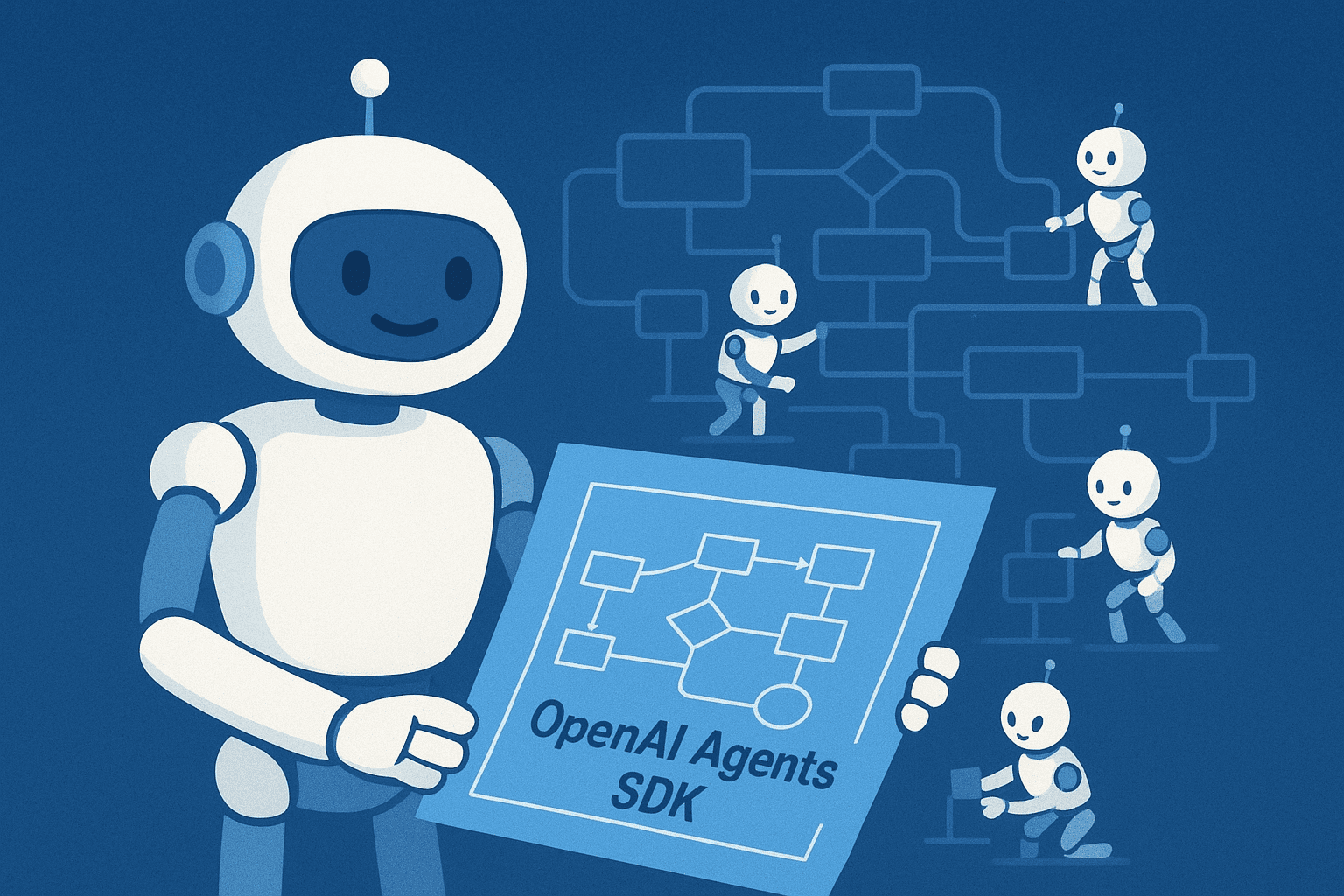Building AI agents used to mean weeks of custom infrastructure: state management, tool orchestration, error handling, conversation tracking. Every developer was solving the same problems with different homegrown solutions.
OpenAI's Agents SDK changes that. It provides the four core primitives every agent needs—agents, handoffs, guardrails, and observability—as a standardized framework. No more reinventing the wheel.
What Is OpenAI's Agents SDK?
Let me break down what OpenAI actually built here, because this isn't just another AI library—it's the formalization of everything we've been trying to solve with custom code.
The SDK gives you four core primitives that any of us who've built agents will recognize immediately:
Agents: These are configurable LLMs with built-in instructions and tool access. This is the same thing as sending in a custom prompt to the model, now it has a name and is integrated with the 3 other main primitives.
Handoffs: This one is cool. So before this standardization, you would have to programatically manage when Agent A should "pass" control to Agent B, and how to maintain context across that transition. Now it's all built in making far quicker to setup and maintain.
Guardrails: Again prior to this SDK, you would have to write custom input validation checks and output sanitization logic. Now it's all built in making it far quicker to setup and maintain.
Tracing & Observability: This one is my favourite and actually the most helpful. You can observe the entire multi-agent workflow and see exactly what happened at each step making it far easier to debug.
Standardization matters because it reduces duplicated infrastructure and aligns patterns across projects. Before the SDK, agent stacks reimplemented state, tool orchestration, and error handling in incompatible ways. With a shared framework, handoffs become predictable, debugging practices transfer, and third-party tools have a clear target—freeing teams to focus on problem-specific logic rather than plumbing. Early signals—open-source adoptions and vendor integrations—suggest momentum is real, but the meaningful gains will be quieter: fewer flaky runs, simpler reviews, and easier collaboration.
The Technical Evolution
Having built custom agent orchestration systems, I can appreciate what OpenAI actually accomplished here. The SDK's design strikes a really nice balance between being opinionated enough to solve common problems, but flexible enough to handle edge cases.
The Agent Loop abstraction is particularly clever. It handles the entire cycle of calling tools, sending results to the LLM, and looping until the task is complete. That's exactly the kind of boilerplate that every agent needs, but nobody wants to write from scratch.
The Sessions management is another standout feature. Automatic conversation history tracking across agent runs? Yes, please. I can't tell you how many bugs I've had to track down because my custom state management got confused about what happened three interactions ago.
And the Function Tools approach is great. You write a Python function, and the SDK automatically generates schemas, handles validation, and integrates it into the agent's toolkit. It's the kind of developer experience that makes you wonder why anyone would go back to custom implementations.
Where This Is All Heading
I think we're witnessing the moment where AI agents transition from experimental projects to production infrastructure. Just like how cloud platforms like AWS formalized what system administrators were cobbling together with servers and scripts, OpenAI's SDK is formalizing what we've been building with custom agent frameworks.
The implications are massive. We're about to see an explosion of agent-powered applications because the barrier to entry just dropped by an order of magnitude. Want to automate your company's expense reporting? That's now a weekend project instead of a quarter-long engineering initiative.
But here's what really excites me: the emergent behaviors that come from standardization. When everyone's using compatible frameworks, agents can start discovering and collaborating with each other in ways that were impossible with custom implementations. We're heading toward a world where your personal productivity agent might automatically handoff to specialized agents for different tasks—a research agent for gathering information, a writing agent for content creation, a scheduling agent for calendar management.
I genuinely think we're about to see the birth of the "agentic economy"—not just tools that help humans be more productive, but entire workflows that are orchestrated and executed by cooperating agents. And frameworks like OpenAI's SDK are the foundation that makes it all possible.
The Bottom Line
If you've been building AI agents, you should definitely check out OpenAI's SDK. It's going to save you weeks of infrastructure work and help you build more reliable systems. But more importantly, by adopting the standard, you're plugging into an ecosystem that's about to explode with compatible tools, services, and agents.
The era of hacky, one-off agent implementations is ending. The era of production-ready, interoperable agent systems is just beginning.
OpenAI Agents SDK: Stop Building Agent Infrastructure From Scratch
How OpenAI's new Agents SDK formalizes what developers have been building in their garages—and why this standardization is about to accelerate ai-development.
Aslan Farboud
4 min read



